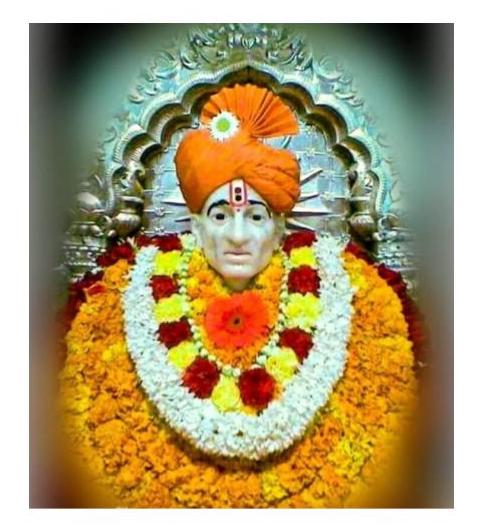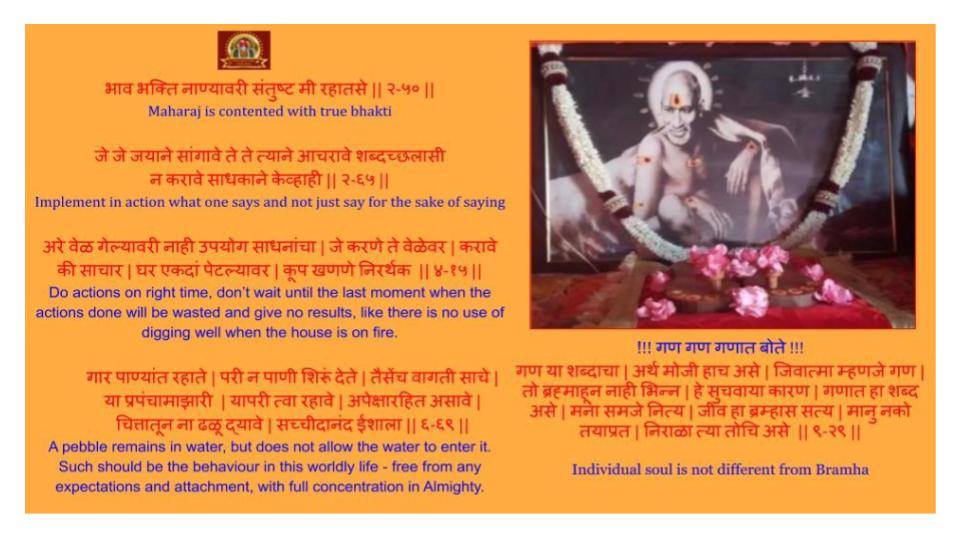Maharaj’s Teachings

Yogiraj Shree Gajanan Maharaj gave many valuable teachings to his devotees through his everyday actions, advice, realizations. He taught how to live everyday life with simplicity, truth, love and compassion. He showed devotees how to live in society accepting each other, maintain health with yoga practice, spend wisely, path to make spiritual progress, ways to attain liberation (moksha) and many other valuable lessons which still prove to be a guiding light for many. The official sansthan approved biography of Shree Gajanan Maharaj namely Shree Gajanan Vijay Granth is available in various translated languages – English, Hindi, Gujarati, Telugu, Kanarese. Shree Gajanan Vijay Granth (referred to as pothi) has quoted these teachings with Maharaj real life manifestation.
In the first chapter of the pothi Maharaj explains food is brahma and not to be wasted by his action of picking up leftover food particles.
In the second chapter Maharaj tells that He is content with true bhakti and does not expect money like a trader. He also advises Shri Govindbua, who is a kirtankar to walk the talk and implement in actions what he preaches to masses and not just preach for the sake of it or parroting words from scriptures. Through his actions, He also told not to force anyone for consuming food more than what one can consume, (as it is unwanted by the body) just to show off one’s riches.
In the third chapter Maharaj proves that he is really a loving Mauli, like a mother who fulfills the child’s silly desire by accepting the wish of Brahma Giri Gosavi to always keep chilim with him. Maharaj explains the importance of tirtha and praying to God by saving the life of Janrao Deshmukh. He assures us that with true devotion, challenging situations can be overcome. In the same chapter Maharaj punishes Vithoba Ghatol for cheating people and thus tells us that everyone gets the fruit as per their actions and stresses to work honestly in all situations.
In the fourth chapter Maharaj tells how important it is to remember God from an early age in life and shows that material possessions and family does not last but God’s grace always stays with us in this life and beyond.

In the fourth and fifth chapters Maharaj also proves He is a real yogi who can generate fire without any source, create water in a dry well and brings true realizations to His devotees.
In the sixth chapter when the honeybees sting Maharaj, He shows how in the case of calamity no one else but God is the only succour.
In the seventh chapter Maharaj explains the importance of yoga and advises people to strengthen their health. Health and physique rank first, then one’s home, and then comes money and respect. Maharaj makes Khandu Patil realize that only money and material possession cannot buy everything, it’s the grace and blessings of God that showers true wishes.
In the eighth chapter Maharaj saves Khandu Patil from being arrested and assures him that though one’s daily life will be filled with problems, with trust in God, one can swim the ocean of life. He also advises Brahma Giri Gosavi to shed his ego and stay away from preaching any sermons without experiencing truth or Brahman.
In the ninth chapter Das Ganu Maharaj interprets the possible meaning of His favorite chant ‘Gan Gan Ganat Bote’ and gives an important message that ‘Individual soul is not different from Brahma’. In the same chapter Maharaj also tells us that it is important to fulfill any promise made to God (navas) and stay true to one’s own words. Maharaj also gives darshan to Shri Balkrishna Bua Ramdasi in the form of Shree Ramdas Swami and gives a valuable message not to doubt Him and trust Him completely. It also reinforces the belief that one of the two brothers of Sripad Sri Vallabh later on takes re-birth as Swami Ramdas and later as Swami Gajanan.
In the tenth chapter, Maharaj advises Ganesh Appa to speak boldly on what he thinks and not to shy away. Maharaj also does leela with Balabhau and gives an important message to Bhaskar Patil not to be jealous of anyone and all people should work together with love and respect. Maharaj also gives the teachings to be kind to all animals with the leela of taming a naughty and aggressive cow.
In the eleventh chapter Maharaj explains Karma, conveys to us that any wrong karma will have to be paid off with the explanation of ‘sanchit’ , ‘prarabdha’ and ‘kriaman’ for the next lives. The story of Ganu Jaware and bhakt Pitambar in the twelfth chapter tells us Mauli is ‘smartugami’, comes to help instantly when remembered with true faith.
In the twelfth chapter Maharaj gives a very important lesson to Bacchulal Agrawal to not show off of the wealth and to do things genuinely from the heart with the love for God; while at the same time fulfilling Bacchulal’s earnest desire of building a spacious temple dedicated to Sri Ram. Maharaj also indicates he is paramhansa sanyasi and will live in the land that does not belong to anyone and advises all to contribute together to find a land to build the temple.
In the thirteenth chapter, Maharaj, through the leelas associated with Gangabharti and bhakt Pundalik, explains the importance of complete trust in the Almighty, due to which even normal mud can turn to medicine. Bhakt Pundalik and Gangabharti are saved from a deadly disease.

In the fourteenth chapter Maharaj suggests to follow Guru’s words by the leela of Narmada river and also shows Mauli’s protection in the time of need. Also that a string should not be pulled too tight and that one should not force one’s way with anybody.
In the fifteenth chapter through the episode of Bal Gangadhar Tilak, Maharaj predicts beforehand that Tilak’s speech could land him into trouble with the authorities, thereby showing to the world He was an antaryami. He explains the importance of talking without arrogance and conveys the importance of giving due respect to saints.
In the sixteenth chapter Maharaj shows His loving nature (bhaktvatsal) to His devotee, Bhau Kavar, by waiting for simple food offered with love, thus explaining the importance of simplicity and love. Maharaj prefers simple food in preference to rich and sumptuous items offered to Him.
In the seventeen chapter Maharaj explains all religions should work together and live peacefully, as God is one. The material used to build temples or mosques or churches is the same, brick, sand and mortar. He also indicates that one cannot bind Him with cloth and chains and He is a free person who has descended on earth to do good to mankind.
In the eighteenth chapter the story of Bapuna Kale tells us how true devotion can lead to God’s vision thus proving God loves true devotion (bhakti) and can take any form for their true devotee (bhakt).
In the nineteenth chapter Maharaj tells the three paths leading to liberation (mokshya) – karma, bhakti and gyan and also gives the assurance to guide his devotees even after He leaves the body.
In the twentieth and twenty-first chapter Maharaj proves his words of helping devotees after samadhi. HBP Dasganu Maharaj stresses the importance of Parayan, faith, devotion, unconditional love for Sadguru and Shree Gajanan Vijay Granth being life saver for devotees. Shree Gajanan Jai Gajanan.
